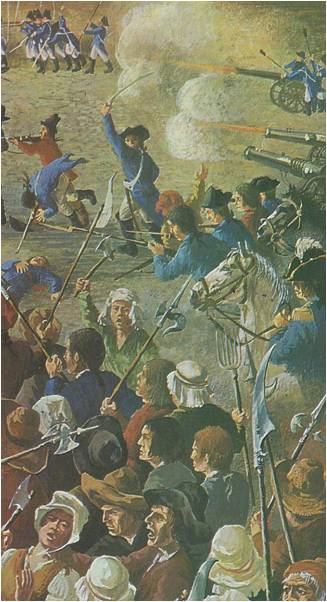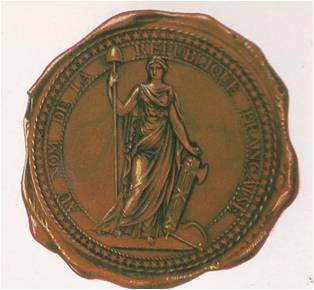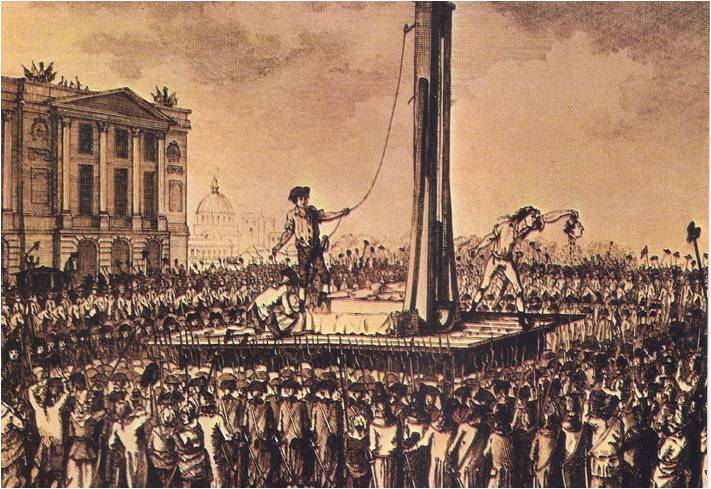“Down with the King!” That cry was heard again and again on the night of August 9, 1792, as restless mobs gathered in the streets of Paris. They had only one purpose in mind and that was to make certain the king was toppled from his throne. The Assembly had been warned to dispose of the king before midnight and that deadline was only hours away. If the Assembly failed to act, the mobs would join forces, march on the royal Palace and seize the king themselves.
As the midnight deadline approached, the frightened members of the Assembly were still in session. It was their duty to protect the king, yet, if they sent more troops to the palace, they could be held responsible for starting a civil war. The Tuileries, as the royal palace was called, was already well guarded by a Swiss guard of 900 troops, about the same number of police and 2,000 of the National Guard.
The members of the Assembly were troubled by many questions, for France now had a constitution and the members were the elected representatives of the Legislative Assembly. The new government was less than a year old. Since the king served as the head of that government, what would happen to it if the king were dragged from his throne?
On the other hand, could the new government survive under the leadership of a king who had lost the trust of the people? King Louis had done a number of things which had turned the people against him. It was his threat to use troops against the people that had brought about the fall of the Bastille three years earlier. Then, on the night of June 20, 1791, he and his family had made an unsuccessful attempt to escape from the country. The people had been shocked. They felt the king had turned against them. If he had escaped, he would probably have returned with an invading army to smash the revolution and regain the full powers of his throne. The people, therefore, came to regard King Louis XVI as a traitor. They found it easy to believe rumours that he and other kings of Europe were secretly plotting to overthrow the new French government.
Many nobles and thousands of officers of the French army had fled the country, increasing the fear of war. When it became clear that Austria was building up the forces along the border, France finally declared war and Prussia soon entered the war on the side of Austria.
THE JACOBINS
King Louis was secretly pleased, for the war gave him new hope. He believed the poorly trained soldiers of the French army would quickly be pushed back. He would then have the opportunity to act as peace maker and demand the return of all his royal powers for saving France from being overrun by the enemy.

Lafayette, who had been given command of one of the French armies, was also pleased by the war. He knew from his experience in America that men who were fighting for liberty, even if poorly trained, could do well against more experienced soldiers. He honestly expected a French victory, which he hoped would unite the people of France behind their government and give them new faith in their king and in their constitution. What worried him was that the French were becoming a divided people. In his view, the French revolution had already been won and now it was time for Frenchmen to support their new government, the king and the constitution. Most people felt that the revolution had not gone far enough, or that more power should be given the government to protect the gains already won. As a result, Lafayette had lost most of his influence as a leader, while other men, such as Danton and Marat, were attracting followers.
Danton, a Paris lawyer and a powerful giant of a man, had led many street riots. He had fought his way up to a leading position in the city government and also became a leading member of the Assembly. Marat called himself the “Friend of the People.” He was a short, ugly, toad-like man with a limp and a squint, who suffered from a skin disease that required him to bathe in hot water for hours on end. He published the most radical newspaper in Paris.
Marat and Danton were both members of one of the most powerful political groups in France. It was called the Jacobin Club because it met in a building that had once been a monastery of Jacobite monks. In the early days of the revolution, branches of the Jacobin Club had sprung up in most of the towns and cities of France. The Jacobins represented the middle-class and also the workers and peasants. As time passed, it tended to become more and more liberal, until its members divided into two groups: a radical group that represented the workers and peasants and a less radical group that represented the middle-class business and professional people. This less radical group came to be called the Girondins, because their most outstanding speakers in the Assembly came from the province of Gironde.
The Girondins, too, were pleased with the war. It gave them control of the government, for the king was forced to appoint his ministers from the Girondins to keep his ministry above suspicion. The radical wing of the Jacobins, on the other hand, was very much against the war. They felt war could only mean defeat for France and more power for the king. They were convinced that the king could not be trusted. He was a danger to the nation and if the people did not destroy him, he would again become their master.
It was no secret that Danton and the radical Jacobins were planning an uprising against the king. Even the commanding general of the invading army, the Duke of Brunswick, knew about it. The duke had so little respect for the French army that he did a very unusual thing. He insulted the French people by warning them not to attack the royal palace in Paris. He said that if the palace were attacked, or the least harm come to any of the royal family, the guilty would be punished and Paris would be destroyed.
The French were outraged. They took the warning as proof that a secret agreement did exist between King Louis and the crowned heads of Austria and Prussia. The Jacobins boldly accused Louis of passing military information to the enemy. How could France hope to win victory, they asked, so long as a traitor sat on the throne? They did their best to stir up the people. They prepared for the uprising which was to take place if the Assembly failed to act before the midnight deadline on the ninth of August.
On that night, many members of the Assembly were still trying to make up their minds about what to do. As the debate went on, screams from the angry mobs in the streets added to the confusion. Suddenly the clocks of Paris struck midnight. Church bells and drums sounded an alarm throughout the city that the Assembly had failed to meet the deadline and people poured into the streets, armed with guns, knives, table legs and long pikes. At City Hall, a group of rebels took control of the city government. Commander Mandat of the National Guard at the palace was tricked into coming to City Hall. On his way he was shot down by a mob in the street. His soldiers fled when they heard the news. Many of them joined the people in their march on the palace.
The royal family and a small gathering of nobles left the Tuileries, crossed a short space of lawn and took refuge in the meeting place of the Legislative Assembly. When the mob arrived at the palace, only the Swiss Guard and a few nobles remained. Someone fired a shot, which was followed by shots from both sides. The Swiss barred the doors of the palace and fired down at the screaming mass of humanity from upper windows. The people kept coming and those in front were pushed from behind, pushed into the deadly hail of bullets from the palace windows. Hundreds were killed and the crowd kept coming on, stumbling over the fallen bodies.
From his seat in the Assembly, King Louis heard the distant sounds of battle. Finally he wrote on a scrap of paper, “The king orders the Swiss to lay down their arms at once and to retire to their barracks.” The Swiss tried to obey, but escape was no longer possible.
The attackers, thinking they had won the battle, smashed down the doors, rushed into the palace and slaughtered the Swiss with swords and pikes. Everything breakable in the palace was destroyed. Only about one hundred Swiss were alive after the riot and these were dragged off and thrown into prison. The victorious people celebrated their victory by roaming the streets in mobs, destroying all the statues of Louis XVI in Paris. King Louis never saw his palace again. He and his family were taken to the tower of an old fortress-like building called the Temple and held there as prisoners.
At his headquarters in the field, General Lafayette still remained loyal to the king. When he was ordered to return to Paris for questioning, he fled across the border, hoping to reach a port where he could sail to America. He fell into the hands of Austrians, who clapped him into prison as one of the leaders of the French revolution.
Lafayette was called a traitor by his enemies in Paris. The Jacobins warned that the country was full of traitors and everyone who had supported the king was under suspicion. Meanwhile, the news from the battlefront was bad. A large army of Austrians and Prussians had driven back the French and each new defeat was blamed on traitors within the army. It was rumoured that French officers and nobles were plotting with the enemy to defeat France, so that King Louis and his nobles could be returned to power again.
Criticism of the government was made a crime. Every newspaper that did not support the revolution was forced to stop publication. Armed bands were organized to make house-to-house searches for weapons and suspects. The weapons were turned over to the army. The suspects were arrested and those who resisted arrest were run through with swords or hanged from the nearest lamp posts.
Marat, who spoke for many of the radical Jacobins, wrote in his paper that spies and traitors had to be killed if the revolution was to be saved. “Five or six hundred heads lopped off and you will be assured of peace of mind, liberty and happiness,” he wrote. Later, he declared that ten thousand heads would be “barely enough to save the Nation.”
Special courts were set up to try suspects, but the trials were too slow to suit the people of Paris. They feared the traitors at home as much as they did the advancing army of the enemy. Marat wanted the guilty ones killed at once. Why should time be wasted trying Swiss soldiers captured at the palace? “What folly it is to even think of trying them!” he said.
The people were frightened and confused. There was no strong leader to guide them, no one to whom they could turn with confidence. The government was weak. Traitors were everywhere. The desperate food shortage was blamed on the enemy, for it was widely believed that the enemy was trying to starve the French to death.
On September 2, word came from the front that the fortress city of Verdun was under attack. It could not hold out for more than a few days at best. When Verdun fell, the enemy would have an open road to Paris. The people of Paris were warned of the danger by the ringing of church bells and the firing of cannon. Every man and boy strong enough to carry a weapon was expected to join the great army of citizens and march to the front. The men began to worry about their wives and children. Would it be safe to leave them behind when the city jails were filled with hundreds of people who were dangerous enemies?
Radicals like Marat warned that the king’s secret agents would open the prisons as soon as the men left the city and the streets would run red with the blood of defenseless women and children. The only thing to do was to kill the prisoners now. Kill, or be killed!

Panic swept the city. A cartload of suspects, headed for one of the jails, was set upon by a mob and the prisoners were torn to pieces. The mob immediately rushed to the nearest prison. Each suspect was identified, asked a few questions, then taken outside to be clubbed and cut to pieces by the waiting citizens. When the executioners had finished their work at one prison, they moved to another and few prisoners escaped with their lives.
One of the survivors wrote in his diary that at “three in the morning we heard them breaking in one of the prison doors. Our first thought was that they were coming to kill us in our room. Then we heard loud voices from the staircase and realized that they were attacking a room in which a number of prisoners had barricaded themselves. They were all butchered there, as we soon gathered from words and cries.”
For four days the massacres continued and neither the Assembly nor the city government had the courage to interfere. The commander of the National Guard later explained that he had not ordered his men to protect the prisoners because he knew that such an order would not have been obeyed. So the slaughter went on until the people were satisfied that all political suspects – more than eleven hundred of them — had been put to death. Violence spread to many other cities in France after the Paris government announced “that a number of the ferocious conspirators held in prison have been put to death by the people,” and recommended that similar action be taken in the provinces.
On the military front, the enemy took Verdun on September 2 and continued on toward Paris. Heavy rains and lengthening supply lines slowed down the advance. Finally, on September 20, the French made a stand on a bill near Valmy. The enemy was forced back and began a retreat to the border. Paris and France were saved.
On the very day of the French victory, a newly elected National Convention held its first meeting in Paris. Its purpose was to write a new constitution for the “Republic of France.” The country was never again to be ruled by a king, so the Convention declared. Its representative form of government was to be somewhat similar to that of the United States.
The Convention was faced with the problem of what to do about Louis, the ex-king. They could not very well keep him and his family in prison for life. He could be banished from the country, of course, or tried and punished like a common criminal. The radical Jacobins felt that the country could never be safe so long as he remained in France. They wanted him put on trial and punished. The less radical Wing of the Jacobins, the Girondins, thought the king should remain where he was for a while. Arguments for and against trial continued for some time. Then a workman at the palace happened to discover an iron chest filled with Louis’ private papers. These papers proved that he had been plotting with enemies of the revolution.

Now even the Girondins had to agree that the ex-king should be tried as an enemy of the state. The Convention heard the evidence in the case and found him guilty. On January 20, 1793, he was sentenced to die within twenty-four hours. The following morning, a cold rain was falling when Louis XVI, in a heavily guarded carriage, took his last ride. Soldiers lined both sides of the street. Behind them crowded the people of Paris, watching in silence as the carriage rolled by. If they were lucky enough to have a clear view, they caught a glimpse of the king’s head bent over his prayer book as be read the Psalms of David.
A flourish of trumpets announced the king’s arrival at the Place de la Révolution and the carriage drew up beside the tall beheading instrument known as the guillotine. Thousands of persons watched as Louis climbed to the blood-stained platform. He tried to speak, but could not be heard above the thunder of drums. With help, he removed his brown velvet jacket and his tie and opened his shirt at the throat so that the blade could cut cleanly. A few moments later, the heavy blade fell and the royal head of Louis XVI tumbled into the waiting basket. The executioner held up the head so that everyone could see it.
“Long live the republic!” shouted the people. “Long live liberty!”
The king was dead. Some of the people, with tears in their eyes, crossed themselves. Others fought with each other to get bits of his clothing, or to dip their handkerchiefs in the king’s blood. One man ripped off the king’s bloody shirt and waved it like a flag at the end of his pike. For long years the people had lived under the rule of kings. Now they felt free and they celebrated by dancing around the guillotine and singing the song of the revolution, the Marseillaise.





